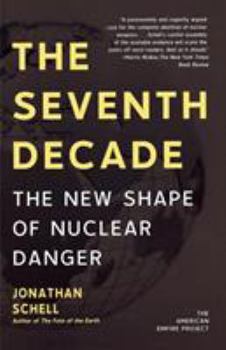Book Overview
From the bestselling author of The Fate of the Earth , a provocative look at the urgent threat posed by America's new nuclear policies When the cold war ended, many Americans believed the nuclear dilemma had ended with it. Instead, the bomb has moved to the dead center of foreign policy and even domestic scandal. From missing WMDs to the outing of CIA agent Valerie Plame, nuclear matters are back on the front page. In this provocative book, Jonathan...
Format:Paperback
Language:English
ISBN:0805088660
ISBN13:9780805088663
Release Date:September 2008
Publisher:St. Martins Press-3PL
Length:272 Pages
Weight:0.60 lbs.
Dimensions:0.8" x 5.5" x 8.5"
Customer Reviews
4 ratings
Excellent
Published by Thriftbooks.com User , 16 years ago
Schell provides a succint history of the development of nuclear weaponry, the strategic theories of their use and deterrence, and their dangerous proliferation following the end of the Cold War. Our future world with nuclear arms is neither optimistic nor pretty. This book is an excellent essay for a person who wants a thorough overview of the subject of arms control.
Nuclear Threat Hasn't Gone Away
Published by Thriftbooks.com User , 16 years ago
A must read to understand the current nuclear threat and a rational, if not extremely difficult, roadmap to reducing worldwide nuclear weapons hardware to zero. Schell undertands the subject as a longtime expert and makes the point that unless we act, nuclear weapons will proliferate among state and non-state actors who are more likely to employ them than at anytime since 1945. Kenneth Adelman, a member of the Defense Policy Board and past Director of the U.S. Arms Control and Disarmament Agency, in a discussion with Jonathan Schell on NPR agreed Schell's proposals were "nice" but not practical. Schell countered that his proposals were "essential" and would be implemented one way or another. He'd prefer they be implemented before a nuclear device or devices were exploded on U.S. soil but they'd certainly be implemented after such a catastrophic event. Adelman believes (as does the Bush Administration) that the best we can hope for are strong non-proliferation efforts, strenghtening nuclear weapons tamper resistance and improved nuclear security for nations which already have them, and the certainty that any nuclear device exploded in America which can be traced to a donor country will result in massive retaliation (read nuclear retaliation). Schell generally agrees with Adelman and points out we must then take the next step to reducing nuclear weapons hardware worldwide to zero. Probably the most difficult diplomatic task of the 21st Century! An excellent read to fully understand the nature of the threat in this new century.
A Must Read For the Concerned Layperson and Expert Scholar Alike
Published by Thriftbooks.com User , 17 years ago
I thoroughly enjoy reading Schell. He is a brilliant wordsmith and master of metaphor. Schell's keen insight added a new dimension to my understanding of the history of nuclear weapons and their proper role in our future security. There is nothing arcane in The Seventh Decade. It is filled with interesting, informative, and important lessons from history that Americans in particular must be mindful of in order to avoid sharing the fate of every previous great world power, and humanity in general must learn in order to avert causing its own doom. Bruce A. Roth Founder of Daisy Alliance (www.daisyalliance.org) Author of "No Time To Kill" No Time To Kill
kudos to Schell, again
Published by Thriftbooks.com User , 17 years ago
Since he published The Fate of the Earth, Jonathan Schell has shown himself to be the most cogent and unflinching thinker on the planet about the dilemmas of nuclear weaponry. He has evolved an elegant style that gets beyond the portentousness, perhaps unavoidable given the subject, of his earlier classic. But like The Fate of the Earth, The Seventh Decade is composed in a style of high responsibility, as if our lives were dependent upon the success of his arguments, which in a sense they are. This latest book is perhaps his best yet. In a kind of dividend of the main direction of his thought, he provides the clearest analysis I've seen of our government's ultimate rationale for the invasion of Iraq, set in the larger context of American global strategy. In a refreshing refusal to demonize Mr. Bush and Mr. Cheney, Schell calmly untangles their motivations from the record of events and policy statements, and shows why their larger strategy of total American military domination of the globe, while well-intentioned and even daring, has not only not worked to slow nuclear proliferation, but has actually accelerated it. Schell shows exactly why our post-9/11 American experiment with empire as a way to protect ourselves from both other nuclear powers and from terrorism contains built-in contradictions that doom our hegemonic intentions to inevitable failure. He returns to the bizarre but exhilarating moment of Reykjavik 1986, where Gorbachev and Reagan came close to agreeing to give up their nuclear arsenals altogether, as not only a tragic might-have-been but a model for future efforts. In the end, because Schell faces all the difficulties and complexities directly, this turns out to be a hopeful book about a terrifying subject: p. 14" "Not since the world's second nuclear bomb was dropped on Nagasaki has history's third use of a nuclear weapon seemed more likely." If only our leaders would take a quiet day to reflect alongside Schell! But they probably won't, unless we citizens get involved and ask new questions of presidential candidates, like: Is it realistic to think we can solve the nuclear dilemma by endlessly maintaining our double standard of nukes for the "good guys" and no nukes for the "bad guys"?





